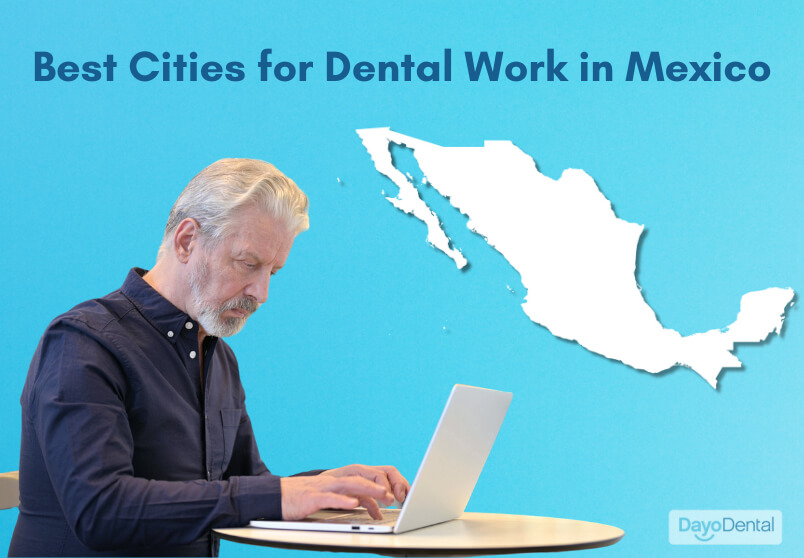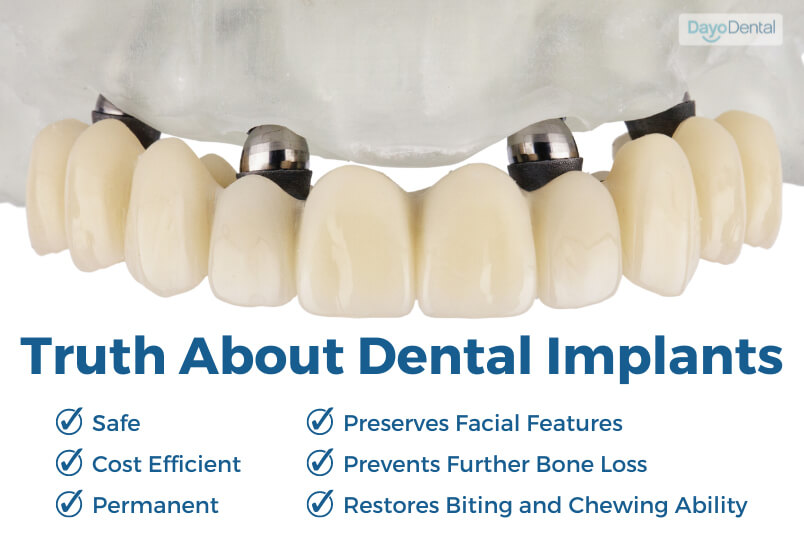16 Crucial Decisions You’ll Have to Make For Full Mouth Reconstruction
A full mouth reconstruction is a way to completely change or rehabilitate the way your mouth looks. We’ve compiled some of the key considerations you should be thinking about before you even get to the dentist.
by Dayo Dental | Updated on 15 November 2022
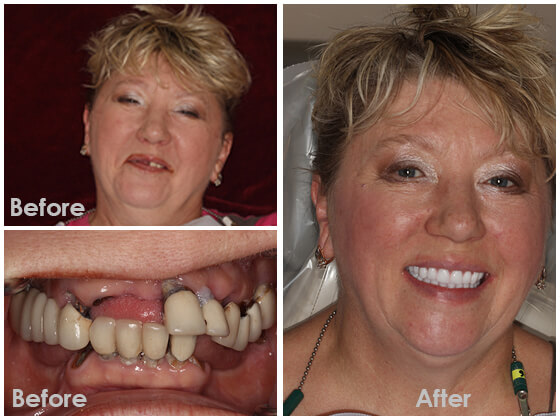
A full mouth reconstruction is a way to completely change or rehabilitate the way your mouth looks. The size, shape, color and position of your teeth can all be changed to look exactly how you want. Reconstruction can restore a mouth lost to decay and misuse, correct problems from birth, or just change the look of your mouth. The result: a boost in your confidence and self-esteem.
If that sounds a little vague and “all things to all people”, well — it kind of is.
But full mouth restorations can achieve many goals through many means. While it may be all things to all people, it’s not one-size-fits-all.
Prices, procedures, and times involved can all vary substantially. In the US, you’re looking at a ballpark cost between $30,000-$90,000USD. The full mouth reconstruction cost varies according to whether you replace all of your teeth, or maintain your natural teeth and modify them.
Suffice to say there are a lot of variables involved, meaning you need to be well informed before you make any decisions. The problem is, dentists often don’t have the time to explain your choices in an in-depth manner during a 15-30 minute appointment. It’s best to be proactive and research the topic first so you can ask informed questions.
We’ve compiled some of the key considerations you should be thinking about before you even get to the dentist. Think about what your goals are, review , and make your own list of questions to ask the dentist. That way you’ll get a much more valuable consultation in 15-30 minutes, and a better sense of what you want to do with your mouth.
Let’s jump in:
Part 1: Getting Started
#1 What’s your goal?
First up, the question that will guide your full mouth reconstruction journey:
Why are you doing this?
When it comes to dental work, goals break down into three categories. There is almost always some overlap between them, but they broadly break down into:
Functional Goals
These can include things like:
- “I can’t eat properly.” Missing teeth or poor alignment can make eating unnecessarily difficult.
- “I don’t want to wear removable dentures.” Do you have removable dentures that you just don’t want to deal with any more? Feel as though they’ve never fit properly? Or maybe you know you’ll need to remove your teeth, but do not want removable dentures.
- “My jaw is starting to change due to lost teeth and I want to stop it.” Bone cells are shed and replaced just like every other cell in our body. Over time, any gaps in our jaw bone left by extracted teeth will start to close up, changing the shape of our jaw.
- “I have an over/underbite that causes issues.” Under and overbites can cause problems with speech and eating.
Esthetic Goals
Concerns such as:
- “I don’t like my smile.” It’s a broad concern, but perfectly valid. It can be for so many reasons, many of which also crossover into the functional and health territory.
- “I can’t get a job because of my bad teeth.” Looks, particularly smiles, are still found to play a major role in job candidates’ chances during interviews.
- “My teeth are crooked or crowded.” This is another issue we could have easily put into another category, as crooked or crowded
- “I don’t want my dentures to fall out.” This is a common worry of people with traditional dentures. The embarrassment of teeth falling out during social situations can be crippling for some.
- “I’ve had different restorations from different dentists over many years, and they don’t match.” Dental restorations can discolor and chip over time. Older restorations might not match newer ones. Different materials will also change appearance at different rates — dental composite, for example, discolors much faster than porcelain. This can leave people with mismatched and unappealing restorations.
Health Goals
- “I have periodontal disease and have been told it’s a losing battle.” You might already know that you need to have your teeth extracted and replaced due to disease.
- “I have temporomandibular joint dysfunction and need to correct my bite.” TMJ and TMD is a condition where the temporomandibular joint (where the jaw connects with the temple) causes problems. Sometimes correcting the bite is the only way to fix it.
FULL MOUTH RECONSTRUCTION TIP:
Think long and hard about why you’re doing this. There’s no right or wrong answer, it just needs to be the answer that is right for you. This is a long-term investment and should not be done impulsively.
#2 Do you need it or do you want it?
Full mouth reconstructions are an expensive and time-consuming endeavor. They’re major works with almost irreversible repercussions in your mouth. In fact, some of the repercussions are irreversible — you can’t put teeth back in once they’re extracted.
Some concerns people have with their teeth can just as easily be addressed with simpler and easier procedures. Crooked teeth, for example, could simply be treated with braces. See an orthodontist and weigh up the situation. It’s a lot cheaper and easier to get braces than to rehabilitate your whole mouth.
There are dishonest people in any industry. It’s entirely possible you’ll find a dentist who tries to talk you into a full mouth restoration when you don’t need one. Know your goal, and check what your options are.
That being said, there are plenty of people who don’t need full mouth restorations who get them because they do want them. Many of our patients in their later years decided to get full mouth reconstructions even though they don’t need them. The reasoning is generally around the lines of “I have maybe 10, 15 years left to live. I’m getting the teeth I always wanted and living out the best damn years of my life while I still can.”
And that’s also fine, so long as it’s your decision.
FULL MOUTH RECONSTRUCTION TIP:
Do your research and make sure you’re doing the right thing for yourself. Maybe you don’t need a reconstruction; maybe you need something smaller. Or maybe you know you don’t need a reconstruction and want one anyway. Make the right decision for yourself.
#3 – Are you a candidate?
A full mouth restoration is a major work often involving a lot of surgery. Are you in good health for it? Are you even suitable? Let’s break it down based on the types of full mouth reconstruction.
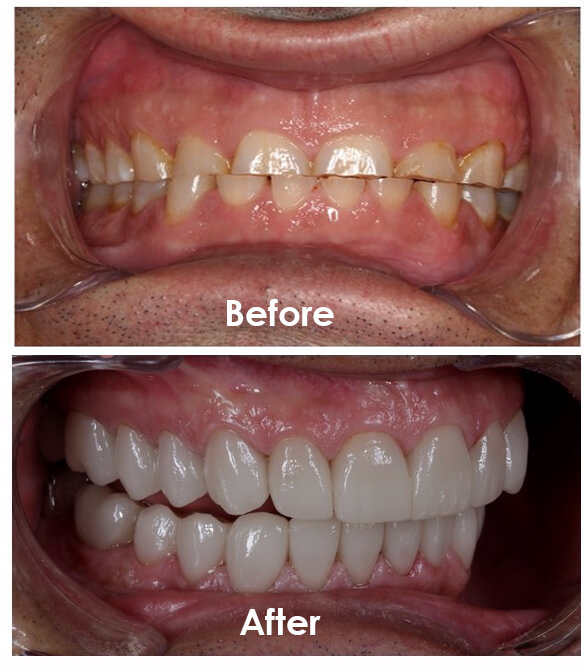
Full Mouth Restoration with Crowns
- Are you just here for crooked teeth? Maybe you don’t need a full mouth reconstruction — braces are often the best bet.
- Are your teeth in generally good health? You might just need some fillings or crowns. If the teeth are in good condition, fillings, crowns, veneers or whitening are often all you need to create beautiful Hollywood smiles.
Full Mouth Reconstruction with Dental Implants
- Do you have enough bone? Dental implants require good bone volume to properly anchor the new teeth into place and provide optimum support. If you’ve been missing teeth for too long, or have too advanced periodontal disease, you might not be able to get dental implants.
- Do you have bone disorders such as osteoporosis? Osteoporosis may prevent you from getting dental implants, but it’s not definite. Let your full mouth reconstruction dentist know of any bone disorders you may have so they can accurately assess your candidacy.
- Are you a heavy smoker? Smoking is a major contra-indicator for any type of oral surgery as it drastically increases the risk of post-operative infections.
- Do you have any kind of uncontrolled systemic disease? Hypertension, diabetes, and bleeding disorders can all preclude you from dental implants.
- Have you recently undergone cancer treatments within the last 6 months? This may prevent you from getting full mouth dental reconstruction.
- Do you have any major age-related issues?
FULL MOUTH RECONSTRUCTION TIP:
If you’re considering a full mouth reconstruction with implants, get cleared by an implant surgeon first. Let them know of any systemic diseases that you think might preclude you from getting the surgery.
#4 – Can you keep your teeth, or do you need to replace them?
Any honest dentist will tell you that it is always preferable to keep natural teeth. Preserving natural teeth lets you eat better, taste better, and let’s face it, saves a lot of money.
Some less-than-honest dentists, on the other hand, might try to convince you to remove otherwise healthy teeth. Extractions and full mouth reconstructions are much higher-ticket items for a dentist than crowns, bridges or veneers. But if you don’t need it, then you’re doing irreparable damage to your mouth for something you could have avoided.
That’s not to say any dentist recommending extracting teeth is trying to fool you. Some teeth will be too damaged, decayed or diseased to be saved. But be wary of anyone who seems overly keen to start pulling teeth and starting over.
FULL MOUTH RECONSTRUCTION TIP:
Favor options that keep your existing teeth in place. If you’re unsure, get a second opinion. Be clear that you’re worried you’re being asked to unnecessarily extract otherwise viable teeth.
#5 – What is your budget?
It’s possible to overspend and blow out your budget on a procedure like a full mouth reconstruction. As we said at the beginning — you can be looking at anything from $30-90K. Before you begin, know how much you’re willing to spend, or how big a loan you’re willing to pay back.
Obviously we’d all like to spend as little as possible, but that’s not exactly practical. The first step to knowing your budget is having an idea of the costs involved. Here are some general guides for the various procedures involved in full mouth reconstruction. We compare the price of getting the work done in the US, vs. finding a dentist in Mexico near Texas border.
Here’s a quick summary of the full mouth reconstruction cost Mexico vs US:
| Full Mouth Dental Implant Cost | Mexico Cost | US Cost |
|
Single Tooth Implant with Crown per tooth |
$1,805 |
$5,000 |
|
Snap on dentures with 4 dental implants per arch |
$7,700 |
$20,000 |
|
Fixed Bridge with 4 to 6 dental implants per arch |
$11,800 |
$26,500 |
|
All on 4 per arch |
$11,800 |
$26,500 |
|
All on 6 per arch |
$11,800 |
$26,500 |
FULL MOUTH RECONSTRUCTION TIP: Get multiple cost options from different dentists — at least three, ideally. Don’t get too stuck in your own neighborhood; a trip across the border might be just what you need to get the best price without sacrificing quality.
#6 – How are you going to pay for it? Does dental insurance cover full mouth implants?
This ties back into the above — when thinking about your budget, also think about where the money will be coming from.
Thinking of full mouth reconstruction with insurance to cap the cost? Your family and friends may recommend a dental insurance that covers full mouth reconstruction. You’ll most probably not get the full amount paid, but some parts of the process may fall under your cover.
Your other options are to pay cash or finance it.
- Cash is good because you won’t owe any money or have to pay interest, but means you’ll likely need to wait longer before you can afford it. You miss out on the immediate gratification but save yourself financial concerns later.
- Dental Financing allows you to split the payment over more easily managed installments. You can combine this with cash or loan payments, but remember it may incur interest.
- Local bank loan is your best option for getting large amounts upfront, but you’ll be straddling yourself with a debt and interest. You get the instant gratification of getting most, if not all, of the work done quickly, but leave yourself with a financial burden.
When it comes to raising cash, you could dip into savings, take a second mortgage, sell belongings you no longer need, or even try to find a benefactor. Well-off parents are often willing to support their children through major financial troubles. If you don’t think you have a viable way of raising the cash, however, you’ll be left financing the process.
FULL MOUTH RECONSTRUCTION TIP:
Regardless of how you choose to pay, don’t pay for everything upfront. Full mouth reconstructions have many parts and can be split over installments. By paying for pieces at a time, you make the funds more manageable and also give yourself the option to change dentists if your current one isn’t working out.
And as always, read the fine print when it comes to any sort of financing. Some financing will give you 0% interest periods, then apply high interest afterward — and even apply it retroactively to the interest-free period.
#7 – Which dentist will do the work?
You’ve only got one shot at this, so take your time finding the right dentist. You must find a dentist you can trust, and who has experience. This is complex, expensive, life-changing work, and cannot be entrusted to just anyone.

Do as much research as you can about different dentists and read reviews. Beware, however — even reviews can be misleading. You’ll need to stay on your toes about whether reviews are legitimate, or if they seem to be spam reviews to boost the dentist’s online reputation.
Especially beware of researching dental offices. You want to research the individual dentist. A dental office will talk about “combined experience” and knowledge — but how much of that “combined” experience was done by the dentist you’re considering?
FULL MOUTH RECONSTRUCTION TIP:
Look up the training and credentials of your dentist. How many cases have they performed? How many years’ experience do they have? And do they guarantee their work?
#8 – Where do you want to get the work done?
There are many dentists in the country. You can likely throw a stone and it’ll land near a dental office. It can be tempting with so many options nearby to only shop around your local neighborhood.
Full mouth reconstruction work is complex, expensive — yes, we realize we’re repeating ourselves, but it’s important. It might be that the best person for you is down the road. But they might be in the next town or state or even country. Consider the experience and affordability of the different options. Expand your horizons.
FULL MOUTH RECONSTRUCTION TIP: Regardless of where you go, take a buddy with you. Consider making it a vacation event, and look at medical tourism. Why not get a procedure done in a resort town, where you can heal and rest?
Part 2: Choosing Your Full Mouth Reconstruction
#9 – What type of full mouth reconstruction do you want / need?
Very broadly speaking, full mouth reconstructions break down into two types:
Type One: Restore Existing Teeth
The dentist uses a variety of restorative techniques to maintain your natural teeth as much as possible. This typically involves using:
- Crowns on (almost) every tooth.
- Fillings to repair cavities and decay.
- Root canals to save badly infected teeth from further decay.
- Dental bridges or implants to replace individual teeth or small sections of missing teeth.
Type Two: Full Mouth Implant Restoration
The dentist extracts any remaining teeth and replaces them with full mouth implants. Full mouth implants come in several flavors, the most popular of which are:
- Overdentures, with 4-6 implants per jaw.
- All-on-4, which uses just 4 implants on each jaw.
- Fixed bridge implants, with 4-8 implants per jaw.
PROCEDURE | ADVANTAGES | DISADVANTAGES |
Full Mouth Crown Restoration | Maintains your natural teeth. Allows you to taste food better. Less invasive | Restorations may need to be replaced after many years due to wear Recurring teeth problems after 10 years if you don’t maintain proper hygiene |
Overdentures | Less expensive Easy to clean | Denture will need to be replaced more frequently than other implant-supported options |
Fixed Bridge Implants | Non-removable Taste food better than overdentures Not as much pressure on the jawbone. | More implants than All-on-4 or overdentures Acrylic used for the gums can stain over years Harder to clean than overdentures |
All-on-4 | Restore an entire row of teeth on just 4 implants Potential for immediate loading of implants | No implants over the molars, meaning less support and stability Only ten teeth per jaw (normal jaws have 14 teeth) Thicker fake gum tissue |
FULL MOUTH RECONSTRUCTION TIP:
Beware of dentists who try to convince you there’s only one option. Some dentists try to push All-on-4, for example, where other methods might be more popular. As with the previous tip, exhaust all possibilities for maintaining your natural teeth before going for implant restorations
#10 – Do you want just the top teeth or both top and bottom teeth restored at the same time?
It’s often possible to just get one arch of teeth done at a time. There are some obvious downsides — you double the length of your treatment; you have to undergo surgeries twice. But there are good reasons and a few possible benefits to taking your full mouth rehabilitation in stages.
Budget
The obvious reason to break your full mouth reconstruction into stages is money. You might like to only pay for what you can afford and not burden yourself with large loans. While you’ll miss out on the instant gratification of getting everything done “now”, you also don’t end up in financial hardship trying to pay off a $55K loan.
Try a Procedure
If you’re going with an implant supported full mouth reconstruction, you might like to test overdentures vs fixed dentures. You could try the less costly overdentures on the bottom jaw and see if you like the removable dentures. If not, you can use fixed bridge implants on the upper jaw.
Try a Dentist
You might not know your dentist well, or be unsure of their skill. What if they’re rough? What if the quality is less than you hoped? Shelling out $25k on a single arch is a cheaper and less risky venture with someone you’re unsure of than $50k for both arches. If you’re satisfied with the results, great — proceed with the other arch.
FULL MOUTH RECONSTRUCTION TIP:
Don’t go bargain shopping for the cheapest dentist. Like with anything in life, you get what you paid for. Consider going to Mexico, where high-end work costs significantly less than comparable work in the US. With Dayo Dental, you can save 50-70% of your full mouth implants cost and know you’re seeing only the top 5% of Mexico dentists.

# 11 – What color do you want your teeth?
This is something a lot of people don’t even stop to think about when they get full mouth reconstructions. You don’t need to be stuck with your original tooth color. You also don’t need to get obviously fake, super-white teeth. When you get a full mouth reconstruction, you can choose the exact shade of white you want for your teeth.
Things to consider would be your age, skin color, and any existing restorations you may have. Going for a natural color will make your new teeth less obvious.

FULL MOUTH RECONSTRUCTION TIP:
Ask to see color samples — every dentist has a set, and you’ll be able to select the exact shade you want. If possible, try to see the color in natural lighting. Artificial lighting can mask the true color, so you might end up with something unexpected.
#12 – What size and shape do you want your teeth?
Much like people don’t stop to think about color, many don’t stop to think about size and shape. Do you want the teeth to be longer or shorter than they are now? Or the same size? More rounded — common for women — or more square — common for men?
Take the time to consider this. You’ll have these teeth for the rest of your life — make sure they look how you want them to. Your dentist or prosthodontist will have input, but at the end of the day, it’s your call.
FULL MOUTH RECONSTRICTION TIP:
Liked your old teeth? Bring a reference photo. Like someone else’s teeth? Bring a reference photo. Your dentist will have the best results if you give them something to work from.
# 13 – What material do you want to use?
The exact material you use to get your restoration done — be it crowns or implants — is one of the most important decisions you’ll make. The material will affect the cost, look, and durability of your reconstruction. Always ask your dentist for a choice of materials.
Full Mouth Crown Reconstruction Materials
Material | Description | Pros | Cons |
PFM | “Porcelain fused to metal”, an older method not commonly used today. | Strong crowns | Not aesthetic due to lack of translucency |
Captek Crowns | Porcelain fused to gold, reinforced with platinum and palladium. | Incredibly strong crowns Strong aesthetics | High cost |
All Porcelain Crowns | Commonly used with natural-looking results. | Strong crowns Aesthetically pleasing non-allergic | Less durable than some options Possibility of tooth sensitivity |
A crown made entirely out of zirconium. | Strong Aesthetically pleasing Maintains more of the natural tooth structure | Zirconia crowns may be too tough and wear down opposing teeth Hard to tell if any decay is occurring beneath the crown High cost |
Full Mouth Implant Reconstruction Materials
Material | Description | Pros | Cons |
All Acrylic | Old method, rarely used Porcelain goes on top of metal alloy | Lighter material Has flexibility Acts as shock absorbent for bone | Has some micropores, and needs to be cleaned or replaced every 5-7 years |
Acrylic with Composite Teeth | Acrylic base simulating gum Composite teeth | Flexibility on the gum Stronger teeth than with all acrylic | Same micropore issues as above Composite material is not the most durable for teeth |
Acrylic with Porcelain Teeth | Acrylic base with porcelain teeth | Porcelain is visually very similar to enamel Cushioning for the gum Porcelain is a durable tooth material | While durable, the porcelain will still need to be replaced in 10-20 years even with proper care |
Hybrid (Titanium Frame, Acrylic Base, Composite Teeth) | A strong frame with an aesthetic gum base and composite teeth | Durable and reliable Provides a frame to protect the bone beneath | Composite teeth will need repair after several years |
Zirconia Base with Porcelain Teeth | Newer method Porcelain used for finishing teeth | Zirconia is the toughest material available Allows the teeth to be made as thin as possible Can create the least noticeable replacement teeth | Zirconia is inflexible, so not as comfortable as the acrylic bases |
Other Newer Materials |
|
|
|
FULL MOUTH RECONSTRUCTION TIP:
Ask for a waxup model beforehand to see what the teeth will look like. Find a dentist who will guarantee the work, and who will cover adjustments if the restorations don’t fit properly.
# 14 – Full mouth implant restoration — fixed or removable teeth?
If you go for full mouth implant restoration, you have a lot of choices in how you want those teeth to be placed in your mouth. Your biggest question is, do you want to be able to remove the teeth, or leave them fixed in place?
There’s no “right” answer, and each has its pros and cons. If you’re worried about ever being seen without teeth, then obviously go with fixed. If ease of use and cleaning are your preference, go for removable.
Snap-On Full Mouth Implants
Also known as “overdentures.” With these, the dental prosthesis snaps onto the implants and can be removed by the wearer.
Pros
- Easier to clean and maintain.
- Less expensive than fixed options.
- Lighter materials that don’t contribute as much to bone loss, as it acts as a cushion.
Cons
- Thicker materials, meaning you can’t taste food as well as with thinner materials.
- Materials used may not be as durable as fixed options.
Fixed Bridge Restorations
These prostheses are attached permanently to 4-8 implants per jaw. There are several options:
- All-on-4
- Fixed hybrid bridge
- Fixed zirconia bridge
Pros
- Non-removable, so you’ll never need to worry about people seeing you without your teeth.
- Thinner materials for improved taste.
- Often made of longer-lasting materials.
- More reliable support when eating
Cons
- Higher cost
- Harder to clean.
Part 3: Considerations, Risks and Summary
#15 – Full mouth implant surgery decisions
Any surgery requires a lot of consideration. There are many things you will want to think about and make sure to check with your dentist:
- Will you be using local or IV sedation? Let your dentist know about any conditions that might influence the choice.
- Are you an extremely anxious patient? It can sometimes be necessary to get general anesthetic. Find out what your options are.
- What is the recovery time? There will be swelling after surgery, and you’ll want to avoid working immediately afterwards. How long will you need to take off?
- How will you get to and from surgery? Someone will need to get you home. Make sure you have reliable transport arranged. It is not advisable to drive within 24-48 hours of any surgery due to the potential lingering effects of anaesthetic.
- Will you have someone to look after you? As above, it’s best to have someone who can stay with you for the days immediately following the surgery.
- What food will you eat? You’ll need to be on a diet of soft foods immediately post-surgery. It might be a good time to discover what soups and shakes you enjoy eating because you’ll be having a lot of them for a while.
FULL MOUTH RECONSTRUCTION TIP:
Get detailed post-op instructions from your dentist before the surgery so you can plan effectively. Getting the instructions after the actual operation is a bad time to be making plans!
If you do go to Mexico for work, here are some tips.
#16 – Do you know the risks?
Every procedure comes with risks. Every. Single. One. And one as complex as a full mouth reconstruction can carry the risk of several different procedures all in one.
Full Mouth Crown Restoration Risks
- Your dentist might do a bad job fitting the crowns, resulting in an imbalanced bite. This can lead to TMJ problems, grinding down of opposing teeth, and increased risk of gum diseases.
- Crowns might not get sealed properly, breeding decay beneath them.
- Your dentist might discover some of your teeth require root canal treatment.
- Risk of receding gums.
- Crowns can fail and crack.
Full Mouth Implant Restoration Risks
- Damage to the nerves within the jawbone.
- Short term loss of implants.
- Long-term loss of implants.
- Risk of infection from surgery.
- Sinus perforation of the implants.
- Incorrect bite after placing the teeth.
- All-on-4: If one implant fails, most of the rest of the procedure needs to be redone.
FULL MOUTH RECONSTRUCTION TIP:
Find a dentist who at least provides a short-term guarantee on their work. Screen your dentists carefully, and discuss risks openly with your dentist.
Summary
There’s a lot to think about! How will you pay? What type of work? What results? Where will you get the work done? Hopefully, after reading this article you’ll be ready to prepare a checklist of questions for when you talk to your dentist.
Dayo Dental will connect you with one of the top 5% of dentists in Mexico who can guarantee their work for 5 years. If you’re looking to get good quality on a budget, talk to us and we’ll help you get started.
Dayo Dental
Dayo Dental is a US-based company helping American and Canadian customers find the most reputable and qualified dentists in Mexico. Through Dayo Dental Network of pre-vetted dental practitioners, clients can find the top dentists in their field offering top-notch dental services for, often times, a fraction of the cost of US/Canadian prices.
Know More About Dayo Dental




 Can I Use US Financing for Dental Implants in Mexico? Everything You Need to Know
Can I Use US Financing for Dental Implants in Mexico? Everything You Need to Know Dental Tourism Destinations: Best Cities for Dental Work in Mexico
Dental Tourism Destinations: Best Cities for Dental Work in Mexico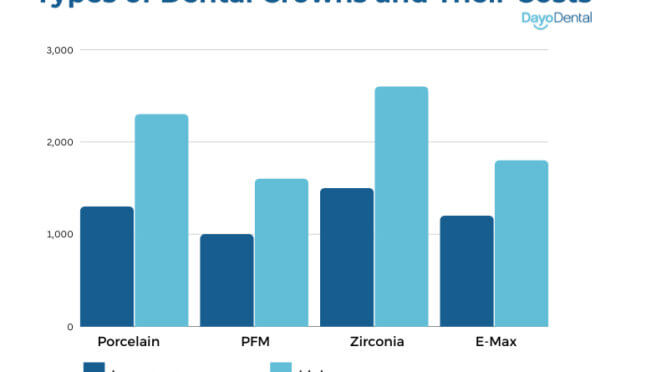 Which Crown Reigns Supreme? Comparing Different Types of Dental Crowns and Their Costs
Which Crown Reigns Supreme? Comparing Different Types of Dental Crowns and Their Costs
